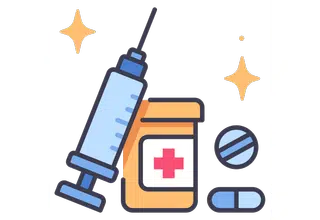by Izzabella Christian, Doctor of Pharmacy Candidate, and Daniel Riche, PharmD University of Mississippi School of Pharmacy

The Beers Criteria, produced and regularly updated by the American Geriatrics Society (AGS), is a widely used list of medications that should be used with caution in adults 65 years or older. The Beers Criteria is not intended to be a clinical mandate; rather, it is a framework to support a provider’s clinical judgment.1 Given the high risk of medication-induced complications, interactions, and adverse effects in older adults, pharmacists play a critical role in alerting prescribers about potentially inappropriate medication use as well as monitoring patients to ensure optimal outcomes.
The AGS last updated the Beers Criteria in 2019.2 In 2023, an update to the Beers Criteria was published, including a few additions, several removals, and some notable revisions.3
The AGS Beers Criteria have five sections:4
- Medications considered potentially inappropriate
- Medications potentially inappropriate in patients with specific diseases or syndromes
- Medications to be used with caution
- Potentially inappropriate drug-drug interactions
- Medications whose dosages should be adjusted based on renal function
Major changes to the AGS Beers Criteria:
- 6 Medications/Classes added to the Beers Criteria
- Sodium-glucose co-transporter-2 (SGLT-2) inhibitors
- Opioids
- Ticagrelor
- Baclofen
- Warfarin and its drug-drug interactions (DDI)
- Dextromethorphan-quinidine
- 20 Medications/Classes modified with new levels of concern or updated language
- Significant Examples
- Aspirin for primary prevention of cardiovascular disease (CVD) was elevated from evidence level D (Use with Caution) to B (Recommendation to Avoid)
- Drug-drug interaction to avoid: Lithium + ARBs or ARNIs
- Drug-drug interaction to avoid: Skeletal muscle relaxants + 3 CNS medications
- Significant Examples
- 38 Medications and drug-drug Interactions were removed from the Beers Criteria
- Medications removed due to low use or lack of availability in the United States
Potentially practice-changing updates to the Beers Criteria include aspirin (ASA) use, SGLT-2 inhibitor use, opioids, and warfarin.
ASA has been moved from table 4 to table 2 on the AGS Beers Criteria, signifying that the panel believes that aspirin should be avoided when used for the primary prevention of CVD.5 ASA significantly increases the risk of bleeding, specifically gastrointestinal bleeding, in elderly patients, resulting in its increased level of concern.6
The use of SGLT-2 inhibitors has increased significantly since the EMPA-REG OUTCOME trial in 2015, with more than 63 million prescriptions dispensed in the United States between January 2015 and December 2020.7,8 The evidence regarding SGLT-2 inhibitors use in the elderly is conflicting. Some studies have shown a favorable risk-benefit ratio for SGLT-2 inhibitor use in older adults at high risk of CVD events or with heart failure. However, older patients are more prone to fractures and acute kidney injury – both of which are safety alerts with SGLT-2 inhibitors.9 Additional caution is required in frail patients who are at higher risk for volume depletion and bone fractures.10
Opioids and warfarin were added to the Beers Criteria due to their well-documented adverse effects. These additions were perhaps overdue, considering the risk of harm and the high prevalence of drug-drug interactions with them.11,12
The AGS Beers Criteria is a comprehensive list of medications that should be cautiously used in older adults. Clinical pharmacists play a vital role in managing medications in the elderly and must be aware of changes to the risks associated with medications as new evidence emerges.

Helpful resources for clinicians and patients:
- AGS Beers Criteria App and Pocket Card available at GeriatricsCareOnline.org
- Public education materials are available for free at HealthinAging.org
- GeriPal Podcast Epidose on the AGS Beers Criteria for Potentially Inappropriate Medication Use
- Heintz P, Buchholz M. After rescue: the importance of Beers Criteria for medication assessment in older adults. Crit Care Nurs Q. 2015 Jul-Sep;38(3):312-6. doi: 10.1097/CNQ.0000000000000072.
- Blog post – Beers Criteria updates: New guidance for geriatric medication safety [Internet]. [cited 2023 Jul 28].
- Many older adults take multiple medications; an updated AGS Beers Criteria® will help ensure they are appropriate [Internet]. [cited 2023 Jul 28].
- American Geriatrics Society 2023 updated AGS Beers Criteria® for potentially inappropriate medication use in older adults[Internet]. [cited 2023 Jul 28]. Available from: https://agsjournals.onlinelibrary.wiley.com/doi/10.1111/jgs.18372
- American Geriatrics Society 2023 Updated AGS Beers Criteria® for Potentially Inappropriate Medication Use in Older Adults. J Am Geriatr Soc 2023. https://doi.org/10.1111/jgs.18372
- Mahady SE, Margolis KL, Chan A, et al. Major GI bleeding in older persons using aspirin: incidence and risk factors in the ASPREE randomised controlled trial. Gut. 2021 Apr;70(4):717-724. doi: 10.1136/gutjnl-2020-321585.
- Adhikari R, Jha K, Dardari Z, et al. National Trends in Use of Sodium‐Glucose Cotransporter‐2 Inhibitors and Glucagon‐like Peptide‐1 Receptor Agonists by Cardiologists and Other Specialties, 2015 to 2020. J Am Heart Assoc 2022; 11: e023811.
- Zinman B, Wanner C, Lachin JM, et al. Empagliflozin, cardiovascular outcomes, and mortality in Type 2 diabetes. N Eng J Med 2015; 373: 2117-2128.
- Cahn A, Mosenzon O, Wiviott SD, , et al. Efficacy and safety of Dapagliflozin in the elderly: Analysis from the DECLARE–TIMI 58 study. Diabetes Care 2020; 43 (2): 468-475.
- Scheen AJ, Bonnet F. Efficacy and safety profile of SGLT2 inhibitors in the elderly: How is the benefit/risk balance? Diabetes Metab. 2023;49(2):101419. doi: 10.1016/j.diabet.2023.
- Dufort A, Samaan Z. Problematic Opioid Use Among Older Adults: Epidemiology, Adverse Outcomes and Treatment Considerations. Drugs Aging 2021;38(12):1043-1053. doi: 10.1007/s40266-021-00893-z.
- Shendre A, Parmar GM, Dillon C, Beasley TM, Limdi NA. Influence of Age on Warfarin Dose, Anticoagulation Control, and Risk of Hemorrhage. Pharmacotherapy 2018;38(6):588-596. doi: 10.1002/phar.2089.






 iForumRx.org is a web-based community of practice designed to inform ambulatory care pharmacy specialists, pharmacy residents, and student pharmacists about high-quality, practice-changing evidence.
iForumRx.org is a web-based community of practice designed to inform ambulatory care pharmacy specialists, pharmacy residents, and student pharmacists about high-quality, practice-changing evidence.
Thanks for highlighting some key updates! I did not realize SGLT2i were added to the list